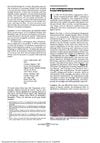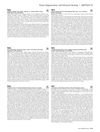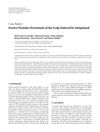 1 citations,
November 2021 in “Biomedicines”
1 citations,
November 2021 in “Biomedicines” Understanding how acne develops in different diseases could lead to new treatments.
 14 citations,
April 2014 in “Medical Clinics of North America”
14 citations,
April 2014 in “Medical Clinics of North America” The document concludes that quick referral and appropriate treatments are crucial for managing common skin conditions and preventing permanent damage.
27 citations,
July 2013 in “Journal of dermatological treatment” Laser therapy may effectively treat persistent scalp inflammation.
 5 citations,
July 2018 in “The Egyptian Journal of Hospital Medicine”
5 citations,
July 2018 in “The Egyptian Journal of Hospital Medicine” The conclusion is that antibiotics are not the best acne treatment and early treatment is important to prevent scarring, especially for those with a family history of acne.
 July 2024 in “ACS Biomaterials Science & Engineering”
July 2024 in “ACS Biomaterials Science & Engineering” Nanoencapsulated antibiotics are more effective in treating hair follicle infections than free antibiotics.
 19 citations,
November 2016 in “Dermatology and therapy”
19 citations,
November 2016 in “Dermatology and therapy” Stopping the medication infliximab and starting new treatments helped a woman's hair grow back and improved her scalp condition.
52 citations,
February 2009 in “Journal of the American Academy of Dermatology” A 93-year-old woman developed a rare scalp condition after therapy, which improved with steroids, not antibiotics.
 6 citations,
November 1996 in “Archives of Dermatology”
6 citations,
November 1996 in “Archives of Dermatology” A man's relapsed leprosy was successfully treated with the antibiotic sparfloxacin.
September 2017 in “The journal of investigative dermatology/Journal of investigative dermatology” EGFR inhibitors cause skin issues and hair loss by weakening skin defenses, suggesting antibiotics and targeted treatments can help.
October 2023 in “Veterinary Science and Medicine Journal” The cat's ear and skin issues improved significantly after 10 days of treatment.
5 citations,
August 1999 in “Disease-a-month” Hormonal imbalances can cause acne, and treatments may include hormone-blocking medications.
 1 citations,
April 2019 in “Journal of Investigative Dermatology”
1 citations,
April 2019 in “Journal of Investigative Dermatology” Cold atmospheric plasma may speed up wound healing and control infections.
 1 citations,
April 2019 in “Journal of Investigative Dermatology”
1 citations,
April 2019 in “Journal of Investigative Dermatology” VB1953 gel significantly reduced acne and resistant bacteria in patients who didn't respond to clindamycin.
 4 citations,
December 2020 in “International journal of research - granthaalayah”
4 citations,
December 2020 in “International journal of research - granthaalayah” Tetracycline can stick to hair follicles and potentially cause hair loss.
 5 citations,
May 2017 in “Current Opinion in Pediatrics”
5 citations,
May 2017 in “Current Opinion in Pediatrics” Hormonal therapies are safe and effective for treating acne in female adolescents, with specific treatments for those with endocrine disorders.
 May 2015 in “Journal of The American Academy of Dermatology”
May 2015 in “Journal of The American Academy of Dermatology” There's a growing resistance to the antibiotic mupirocin in children's skin infections caused by MRSA in New York.
6 citations,
July 2015 in “JAAD Case Reports” Doxycycline can effectively treat hair loss caused by EGFR inhibitors.
 30 citations,
December 2001 in “Journal of The European Academy of Dermatology and Venereology”
30 citations,
December 2001 in “Journal of The European Academy of Dermatology and Venereology” Hormonal therapy is a good option for women with severe acne, especially when there's a chance of hormone imbalance.
 2 citations,
April 2022 in “Cureus”
2 citations,
April 2022 in “Cureus” A healthy woman got a chest abscess from a fungal infection after gallbladder surgery, which was treated but caused temporary hair loss due to the antifungal medication.
 23 citations,
January 2014 in “Molecular Therapy”
23 citations,
January 2014 in “Molecular Therapy” Applying a special DNA plasmid to the skin can make it thicker and stronger.
 3 citations,
August 2017 in “PubMed”
3 citations,
August 2017 in “PubMed” A man got a scalp infection from synthetic hair implants because the procedure wasn't done by a doctor and was poorly managed.
 56 citations,
July 2005 in “Experimental Dermatology”
56 citations,
July 2005 in “Experimental Dermatology” Injected human hair follicle cells can create new, small hair follicles in skin cultures.
 4 citations,
February 2020 in “Journal of Cosmetic Dermatology”
4 citations,
February 2020 in “Journal of Cosmetic Dermatology” Synthetic hair implants can cause severe scalp problems and removing them improves conditions; natural hair transplants are safer and more effective.
1 citations,
December 2020 in “Case reports in dermatological medicine” A patient with pemphigus vulgaris improved significantly after treatment for an additional viral skin infection.
 12 citations,
January 2018 in “Journal of Drug Delivery Science and Technology”
12 citations,
January 2018 in “Journal of Drug Delivery Science and Technology” The new particle system could be a promising treatment for diseases related to the 5-α reductase enzyme.
 August 2023 in “International Medical Case Reports Journal”
August 2023 in “International Medical Case Reports Journal” Acne necrotica can be effectively treated with topical cream and antibiotics.
 9 citations,
July 2017 in “Case Reports in Dermatology”
9 citations,
July 2017 in “Case Reports in Dermatology” Combination therapy helped patient with advanced Hidradenitis Suppurativa achieve remission.
 3 citations,
January 2021 in “Journal of Research in Medical Sciences”
3 citations,
January 2021 in “Journal of Research in Medical Sciences” Certain medications can impact metabolic syndrome, with some improving conditions like high blood sugar and others having no effect.
 25 citations,
August 2007 in “Molecular Therapy”
25 citations,
August 2007 in “Molecular Therapy” Researchers found a safe and effective way to pick genetically modified skin cells with high growth potential using CD24.
 13 citations,
January 2012 in “Case reports in dermatological medicine”
13 citations,
January 2012 in “Case reports in dermatological medicine” An 84-year-old man got a rare scalp condition from using imiquimod cream, which was cured with systemic steroids.























